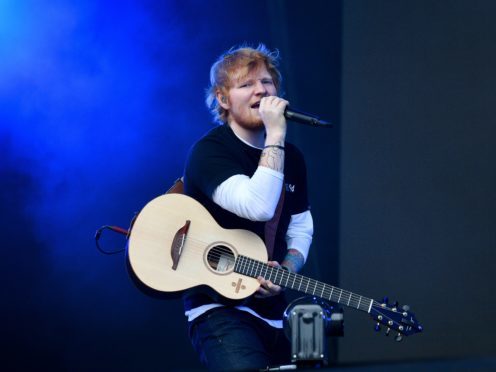Ed Sheeran has insisted that the only people who will lose out in his war against secondary ticket-selling sites are touts – not his fans.
Those attending Sheeran’s concerts this week in Manchester have been asked to buy new face-value tickets upon arrival if theirs were purchased through secondary site Viagogo, as those would be deemed invalid.
Viagogo offers users the opportunity to resell tickets for more than their face value.
We asked @edsheeran about his ongoing battle against ticket 'touts'. #BiggestWeekend #EdSheeran #Swansea pic.twitter.com/MJ0BUeCzr2
— BBC Newsbeat (@BBCNewsbeat) May 26, 2018
Sheeran’s tour promoters Kilimanjaro Live, DHP Family and AEG Presents warned fans in July last year that those who had purchased “unauthorised” Viagogo tickets would not be allowed entry to the concerts.
However, a number of fans turned up at the gigs at the Etihad Stadium on Thursday and Friday and were told to pay for tickets up front at the face value of £80, while being advised to contact Viagogo to claim a refund for their resold tickets.
Many claimed it was unfair and that they could not afford the additional fee while waiting several days for a refund.
Sheeran, who performed at BBC Radio 1’s Big Weekend in Swansea on Saturday, told the BBC’s Newsbeat that his “strong” approach would “be very positive for fans in the long run”.
He said: “The only people it is going to harm in the end is the touts.
“I hate the idea of people paying more than face value for tickets when you can get them at face value.”
“People just need to start taking a stance and within two or three years companies like Viagogo are going to be kaput,” he added.
“I think (Viagogo) are the ones who are pushing out all this stuff that seems really negative, but it will be very positive for fans in the long run.”
Asked about fans having to pay as much as an extra £150 on the night in order to enter his concert, Sheeran said: “What they didn’t print is that they can actually get a refund later.
“It’s all being done properly, I’m not stitching people up.”
He said: “Loads of acts are doing it, Arctic Monkeys, Adele, no one is OK with it.
“The fans are not OK with secondary tickets. Sometimes you can spend all that money and it is a fake ticket.
“I think it is just about being strong and not giving in.”
Kilimanjaro Live founder Stuart Galbraith told the BBC that “everyone who has been through this process has been really grateful”.
He added that there have been “no complaints” and that they are “just trying to make sure people don’t get ripped off”, assuring fans that they will help them to get their refunds from Viagogo and similar sites.
On the FAQ section of its website, Viagogo says that all tickets sold on its platform are “genuine tickets that have been sold on by the original ticket purchaser in good faith”.
They say that they believe it is “unenforceable and illegal” when event organisers deny entry to people who have purchased resold tickets.
“Therefore, as with all tickets on our platform, Viagogo customers should feel confident that they will gain entry to the event, and that is why we back every ticket with the Viagogo guarantee,” they say.
Viagogo told the Press Association in a statement: “It is legal to resell concert tickets in the UK.
“The tickets sold on Viagogo’s platform are genuine tickets that have been sold on by the original ticket purchaser in good faith.
“Attempts by event organisers to cancel tickets on the basis that they have been resold are highly unfair, in our view illegal, and only punish consumers.”
